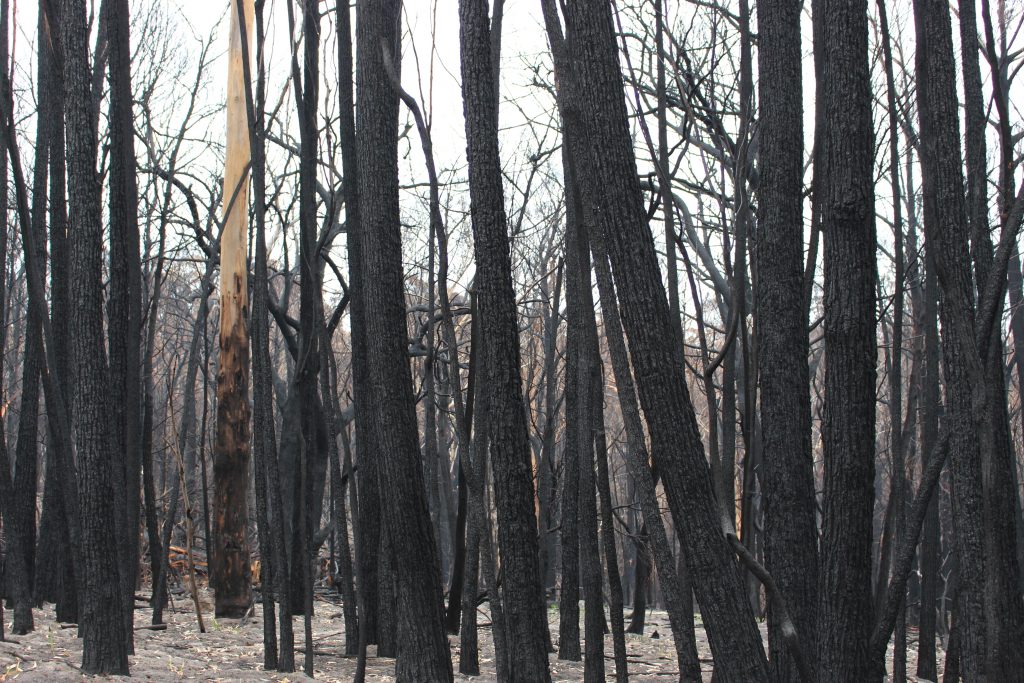
Photo: Ian Campbell
The bushfire emergency across Northern New South Wales and Queensland is all too close for the communities of the Bega Valley.
On one hellish afternoon in March 2018, 65 homes were destroyed in the Reedy Swamp, Vimy Ridge, and Tathra Bushfire. Like the current crisis, conditions at the time were described as “unprecedented”.
A handful of months later the communities of Bemboka, Numbugga, and Brogo spent an exhausting six weeks with the vast Yankees Gap blaze. During the course of those 44 days, four homes were lost, long runs of fencing and rural infrastructure destroyed, and nerves shattered.
With feelings of grief and raw emotion still simmering and unresolved for some, we now stand and watch our regional brothers and sisters further a field wrestling with the same life-altering events.
Indeed some of those who battled the flames of Tathra and Yankees Gap have been sent north – their brawn, brains, heart and recent lived experience will serve northern communities well.
A strong sentiment during the heat of the Bega Valley’s bushfire experience has been to capture the learnings of the experience – the things big and small that have the potential to help others be better in terms of preparation and recovery.
With that in mind, people with a range of experiences offered some thoughts via the #Tathra Strong Facebook page:
Leanne Cochrane – “Don’t make any decisions straight away and ask for advice from those you trust (who have not been directly affected) before committing to anything; be it a lease on a house or an insurance payout.”
Janet Kay Harris – “I know people need material things but they also need space to grieve and to have space to do that. To hear not just voices that speak of moving forward but voices that help work out the roller coaster of emotions that are ongoing.”
Nanette Imsirovic – “Don’t make any hasty decisions, even if you think you are coping you will find you can suffer from bushfire brain [remember] you are not going crazy.”
Carmen Risby – “Accept help. Accept advice. Accept a shoulder to cry on. It’s hard to be accepting and brave at the same time 💕.”
Gaye Preen – “If you can clear up as much as you can around your property. If you have water, wet as much as you can. Pack the car with what you can. Don’t be alone, talk to people have your listening ears on, you do get bushfire brain. Communities stick together and help one and other, accept the help and if you aren’t directly affected you can help someone that is.”
J’Aime Lilith Ishtar – “Please be kind to yourselves. Shock and trauma is going to be very present. You may find that you resort to some dark humour to get through. Don’t beat yourself up about the decisions or choices you made in the moment, don’t spend too much time on the – what if’s. Be mindful that you might react on a hair-trigger some days. There will be things that you can’t forget about and things that you wish you could. Count every blessing that comes your way afterwards. And please don’t think people don’t care because they seem to be getting on with the daily stuff of living their lives. Some days will be better than others and some days will be utter shit. Lastly, you are having a perfectly normal reaction to a very abnormal situation. Survivor guilt is a very real thing so be even kinder to yourself if you feel like you weren’t as affected as others. We all process things differently and some people are able to just move forward and others may be stuck in grief for a long time. Be patient, be kind, and love your fellow people. 💜🙏💜🙏💜🙏💜🙏💜.”
Jo Dodds – “Get a good notebook and keep comprehensive notes from every conversation with authorities, aid agencies, government and others. Your memory will be affected by the adrenalin so keeping a record of all details as you start to tackle the tasks ahead.”
Dörte Planert – “Don’t drink your rainwater, as fire retardant and toxic residue including asbestos from house fires have ended up on the roofs and therefore in rainwater tanks. Help those, who are not insured or did not lose a whole house, but have to live with a burnt balcony/room and have to smell the fire for the next 6 months, looking at the devastation in the neighbourhood, having to listen to all the noise from dismantling and asbestos removal.”
A number of more formal debriefs, reports and resources have flowed from the experience, all around the idea of ‘sharing the lessons learnt’.
Everyone who contributed was focussed on making these documents practical and user-friendly. No one wants these resources gathering dust:
Read –
- Get Ready Sapphire Coast;
- Bega Valley Shire Council Bushfire Recovery Service evaluation and recommendations;
- Tathra Chamber of Commerce Case Study.
Listen –
- “I don’t have enough years left to be miserable” – Jan Reynolds, Yankees Gap Bushfire survivor;
- BEGA VALLEY BUSHFIRE PODCAST – Disaster recovery takes time;
- PODCAST: Bushfire 12 months on – Reedy Swamp, Vimy Ridge, Tathra;
- Festival of Open Minds Podcast – Jo Dodds, from the front line of climate and fire.






